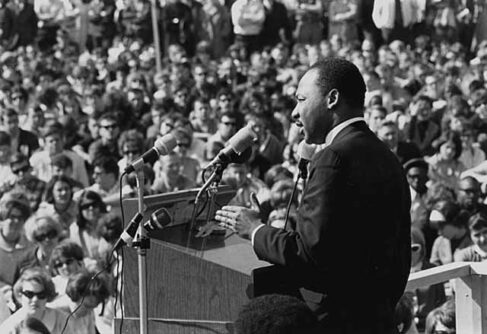The Princeton Battlefield, we’ve also learnt, is at the center of a controversy now before the Princeton Township’s Historic Preservation Commission. The Institute for Advanced Study, the research institute that was home to Albert Einstein and many other academic luminaries, borders on the Princeton Battlefield State Park. The institute has proposed to build fifteen housing units for its faculty members seven acres of the institute’s land that is immediately adjacent to the battlefield. A local group, the Princeton Battlefield Society, is leading the charge against development of this land. (See map and details.)
The Institute for Advanced Study argues that, in order to maintain its vibrant intellectual community, its faculty must have access to new, affordable housing close to the campus. I can well believe its faculty has a hard time affording housing in Princeton: for an amount roughly equal to the monthly mortgage payment on our four-bedroom house in Annapolis (not a cheap town by national standards), we’re renting a run-down duplex a short walk from the Princeton University campus. It’s a fine arrangement for a year and our young son and daughter are delighted for now to share a bedroom and bunk bed, but I readily understand why institute faculty with families would want help obtaining housing near the institute that would have more than one bathroom and wouldn’t require older kids to share a bedroom.
The Princeton Battlefield Society opposes the development of the institute’s land adjacent to the Princeton Battlefield State Park. The society’s president, Jerry Hurwitz, warns that “a critical piece of land that is necessary for the interpretation and understanding of the Battle of Princeton” will be destroyed. (Read full article here.) Both sides acknowledge uncertainty about what parts of the Battle of Princeton took place on the proposed building site.
This is a classic example of the problem of whether restrictions may be imposed upon owners of private land that, while privately owned, is significant to the public for historical, cultural, or ecological reasons. When are such restrictions justified? And, what compensation—if any—is due to owners for such restrictions? And, is private property antithetical to preservation of important public lands?
Land owners who cannot develop their land because it includes habitat protected by the Endangered Species Act are sometimes eligible for compensation from the public purse. The grounds for this compensation is the Fifth Amendment’s so-called “takings” clause, which declares that “private property shall not be taken for a public use, without just compensation.” As it happens, there’s no comparable program to compensate private property owners such as the Institute who wish to develop land with historical and cultural, rather than environmental, significance.
It would be a true loss for our family and others not to enjoy the whole range now available of the Princeton Battlefield, although I expect that the Institute will be allowed to develop the housing it needs for its faculty.
However, private property rights need not only be a warrant turning battlegrounds and other cultural sites into housing tracts—private property rights can also be used to preserve battlegrounds for future generations. Knowing that the most secure way to prevent development is to own the land, the Civil War Trust purchases Civil War battlefield land in order to preserve it from development. Similar strategies have been adopted in the last few decades by environmental conservation trusts that seek to buy up land with critical habitat and ecosystems. The security of private property rights is a good thing, and it can be harnessed by those who care about our heritage to preserve it for future enjoyment.






There will be an important Planning Board Meeting on Thursday,December 1st at 7:30pm at the Township Hall in Princeton, NJ. The Princeton Planning Board will consider voting on the combined major subdivision and site plan review for faculty housing slated for the Institute foe Advanced Study. The housing would be built on the site of General Washington’s army counterattack that won the day for the American forces at the Battle of Princeton on 3rd January 1777.
The Princeton Battlefield Society has been lobbying to save this valuable part of history. It is vital to our history that this portion of the battlefield remains in tact. The Institute plans to bring in 120 truckloads of soil to construct a plateau for the new development, entirely changing the topography of the site and our ability to interpret accurately how the counterattack occurred. In addition the weight of the trucks will destroy any artifacts that may still be buried.
The Institute has not performed an earth penetrating radar study with the most current technology. There are still unanswered questions about the Battle and as it stands now we might never know those answers. The Institute for Advanced Study is an organization that can boost Einstein as one of their members and yet why does their intellectualism stop with a bulldozer? Surely these people understand American history and the magnitude of the loss they are advocating. We rely on scholars to teach the value of humanity and our culture. I ask how the Institute could imagine touching sacred ground where not only American but British soldiers served and perished. Thus is not just a Mercer County problem or New Jersey problem but a national one.
Please join myself and others in this important fight by showing support at the meeting in Princeton on December 1st. For further information please contact the Princeton Battlefield Society at: http://www.theprincetonbattlefieldsociety.com
R. Iain Haight-Ashton
New Hope, PA
This Saturday, the 12th, we are having our “Follow the Revolution” project day. It is family friendly, so please consider coming.
10-4 at the battlefield park or take the drive from Washington Crossing all the way to Princeton with our map.
This will allow you to see the area up close that you are writing about.
Respectfully,
J. Carney- Trustee